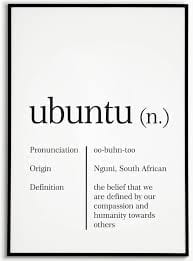Preserving Culture and Fostering leadership whilst rewarding hardwork
Africa’s future rests in the hands of young, visionary leaders who can transform the continent through knowledge, compassion, and unity and the zeal to serve. In the spirit of Ubuntu which means “I am because we are” — the Tutu Ubuntu Scholarship stands as a Pillar of hope, as it presents ambitious and career driven African students a chance to pursue postgraduate studies while nurturing and preserving the moral and ethical leadership the continent so desperately needs.
What is the Tutu Ubuntu Scholarship Really About?
The Tutu Ubuntu Scholarship is an annual award designed to support exceptional postgraduate students from across Africa. Initiated under the Desmond & Leah Tutu Legacy Foundation in partnership with select academic institutions, this scholarship isn’t just about funding education. It’s about cultivating a new generation of ethical, inclusive, and compassionate leaders guided by the values of Archbishop Desmond Tutu himself.
Rooted in the Ubuntu philosophy, the scholarship empowers scholars who demonstrate not only academic excellence but also a commitment to social justice, community service, and leadership. The program aims to build a pan-African network of future leaders who will drive development and unity on the continent.
Ubuntu is a Southern African philosophy and worldview rooted in the idea of human interconnectedness, compassion, and collective humanity. The term comes from the Nguni Bantu languages (such as Zulu and Xhosa), and it is often translated as:
“I am because we are.”
This phrase encapsulates the essence of Ubuntu: the belief that a person’s humanity is inextricably linked to the humanity of others. It emphasizes values like empathy, respect, dignity, kindness, and mutual support. In essence, Ubuntu is about living harmoniously within a community and recognizing that our well-being is tied to the well-being of others.
Origins of Ubuntu
Ubuntu originates from sub-Saharan African indigenous cultures, particularly among the Nguni-speaking peoples of South Africa, Zimbabwe, and other parts of Southern Africa. The term has been used in various forms across multiple African languages and societies for centuries, long before colonization.
Although it predates written records, the philosophy was preserved and passed down through oral traditions, communal practices, and storytelling. Its values were integral to traditional African governance systems, conflict resolution, family structures, and social life.
Ubuntu in Modern Context
Ubuntu gained global recognition during and after the anti-apartheid movement in South Africa. Archbishop Desmond Tutu and Nelson Mandela were among the most prominent voices who brought Ubuntu to international attention.
- Desmond Tutu often described Ubuntu as the essence of what it means to be truly human, and he integrated it into the Truth and Reconciliation Commission, using it to promote healing and unity in post-apartheid South Africa.
- Nelson Mandela echoed these sentiments, promoting Ubuntu as a guiding principle in rebuilding a democratic and inclusive nation.
Today, Ubuntu continues to influence leadership models, ethics, education, peacebuilding efforts, and scholarship programs like the Tutu Ubuntu Scholarship, which carry forward its spirit of service and shared humanity.
Who is Eligible to apply?
The Tutu Ubuntu Scholarship is open to African students applying for postgraduate degrees, particularly at institutions like the University of Edinburgh, which has been a longstanding partner of the program. It welcomes applicants from diverse backgrounds, including law, public health, politics, development, environmental studies, and more.
To qualify, candidates typically must:
- Be resident or citizen of an African country.
- Demonstrate outstanding academic merit and leadership potential.
- Show a clear commitment to Ubuntu values — such as empathy, community involvement, and integrity.
- Meet the academic and language requirements of the host university.
Each year, a handful of students are selected to receive full or partial funding, which usually covers tuition fees, living expenses, and travel allowances.
Why the Tutu Ubuntu Scholarship Matters
In a continent brimming with potential but still facing systemic challenges — from poverty and inequality to climate change and governance — the need for ethical leadership has never been more urgent. The Tutu Ubuntu Scholarship steps into this space not just as a South African scholarship for African students, but as a transformative platform that equips its scholars to become catalysts for change.
Recipients of the Ubuntu Scholarship are expected to carry the torch of Archbishop Tutu’s legacy, embracing a leadership model that is collaborative, humble, and community-centered. They become part of a lifelong alumni network, supported by mentorship opportunities, leadership development workshops, and platforms to amplify their voice across the globe.
How to Apply for the Ubuntu Leadership Scholarship
While the application process may vary slightly depending on the partner university, most Tutu Ubuntu Scholarship applications follow these core steps:
- Apply for a postgraduate program at a partner university (e.g., the University of Edinburgh).
- Once accepted, submit a separate scholarship application outlining your academic background, leadership experiences, and alignment with Ubuntu principles.
- Provide reference letters and personal statements that illustrate your potential for community impact.
Applicants are encouraged to apply early as the selection process is highly competitive, with only a few spots available each year.
Real Impact, Real Stories
Past Tutu Ubuntu Scholars have gone on to make significant strides in their communities — from launching social enterprises and advocating for climate justice to reforming public health systems. These are not just scholarship recipients; they are architects of Africa’s tomorrow.
Their stories show that when postgraduate funding in Africa is tied to values like compassion and inclusiveness, the ripple effect can be profound. These scholars embody the very essence of Ubuntu: uplifting others as they rise.
Conclusion
The Tutu Ubuntu Scholarship is more than just financial aid. It is an invitation to join a movement of ethical leadership, rooted in African identity and community values. For young Africans ready to lead with heart and vision, this opportunity could be life-changing.
If you’re searching for a postgraduate scholarship in South Africa or Africa-wide that aligns with both your career goals and your deeper purpose, the Tutu Ubuntu Scholarship might just be the path you’ve been looking for.


